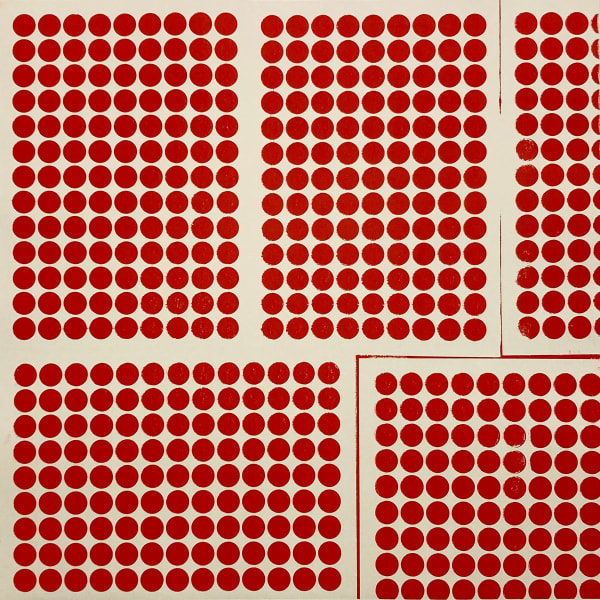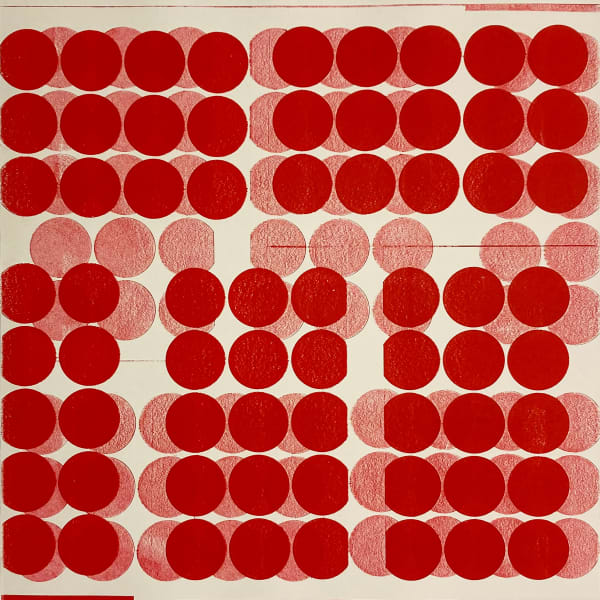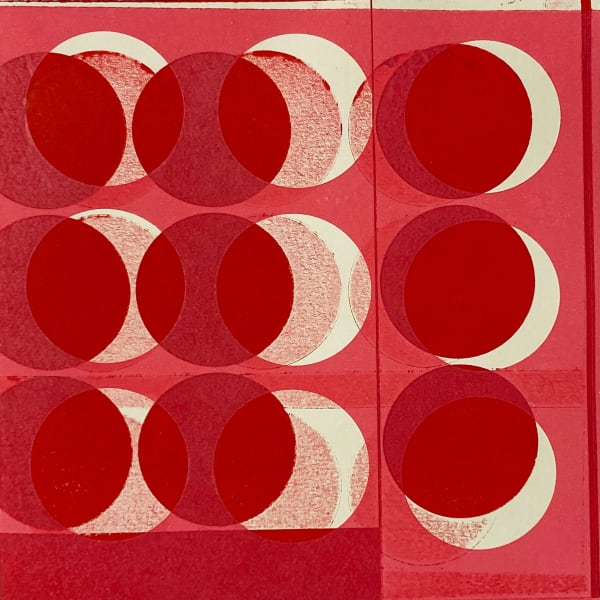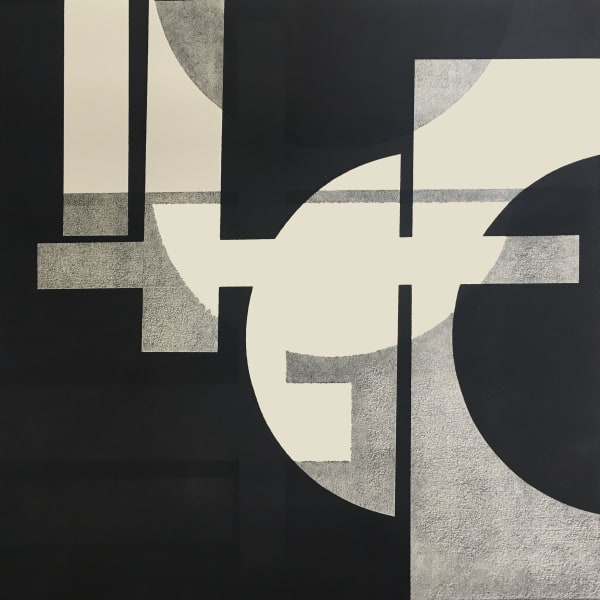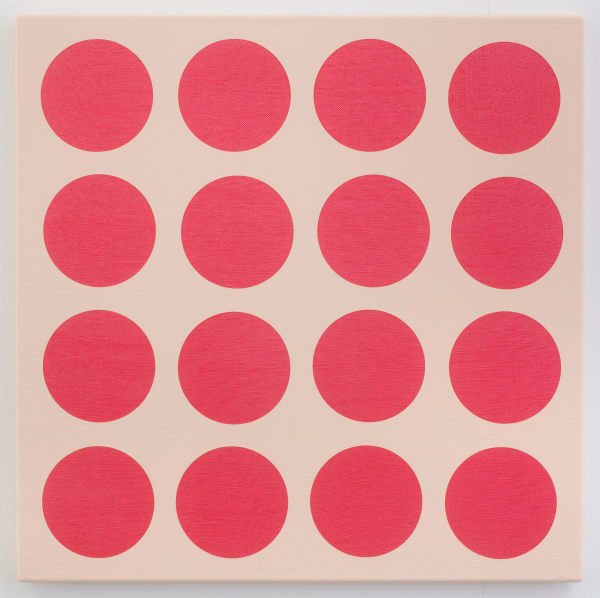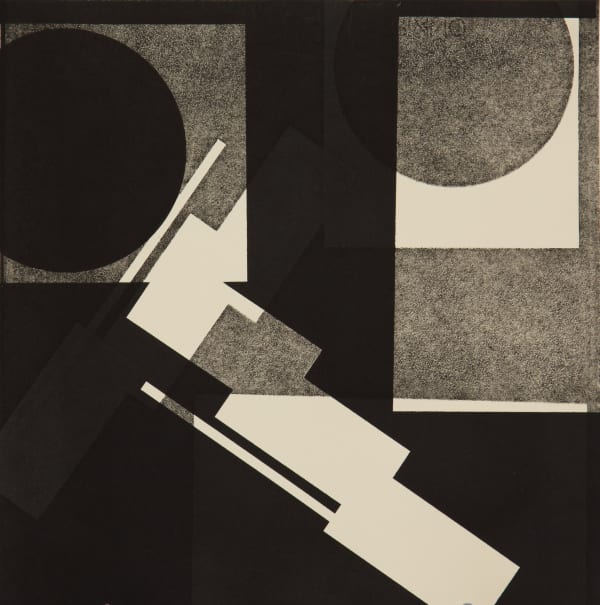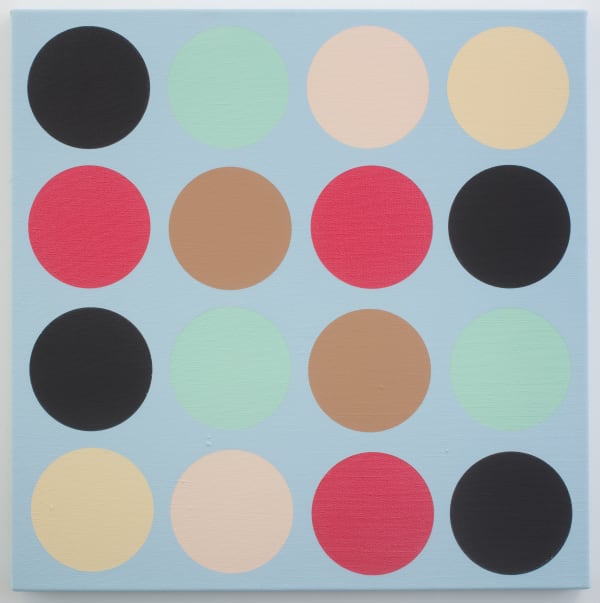Katrina Blannin British, b. 1963
Katrina Blannin was born in London where she currently lives and works. Since graduating from the Royal College of Art in 1997 she has shown her work extensively in the UK and abroad, co-directed artist run project spaces, curated exhibitions and written about contemporary painting. In 2021 she completed a Painting by Practice PhD at the University of Worcester, teaches at UAL Camberwell and UCA Canterbury and works both on the editorial board and the mentoring programme for Turps Banana, London.
A recent project has generated 20cm – 70cm square monotypes: handcrafted prints on acid free Fabriano Rosaspina Ivory - 285gsm printmaking paper. The prints, produced from the summer of 2016 in the printmaking room at the University of Worcester, are part of a Painting by Practice PhD project, and the specific method of production was developed by the artist.
For some of the monotypes the handmade ink is the artist’s own recipe adapted from the traditional Japanese nori (rice) paste and alcohol-based formula that has been used in Japan for hundreds of years, and uses high quality powder pigments. For the larger black and white prints an Intense black Charbonnel ink is adapted through the use of gin and extenders to produce a deep black which contrasts with the ivory colour of the paper. The ink is rolled out evenly over a custom-made cardboard plate onto which the paper cut-out design is carefully placed. The water-soaked printmaking paper is then laid over this and the whole thing is then run through the press. This fast-drying collograph technique lends itself to the idea of a monotype. It is virtually impossible to recreate an image exactly due to the evidence of mis-registration and eye to hand control – each final print is therefore unique.
-
 Katrina BlanninDomenica #4, 2022Ink on Fabriano Rosaspina Ivoire monotype30 x 90 cm
Katrina BlanninDomenica #4, 2022Ink on Fabriano Rosaspina Ivoire monotype30 x 90 cm
11 13/16 x 35 7/16 inView more details -
 Katrina BlanninDomenica #28, 2022Ink on Fabriano Rosaspina Ivoire monotype30 x 30 cm
Katrina BlanninDomenica #28, 2022Ink on Fabriano Rosaspina Ivoire monotype30 x 30 cm
11 13/16 x 11 13/16 inView more details -
 Katrina BlanninDomenica #16, 2022Ink on Fabriano Rosaspina Ivoire monotype30 x 30 cm
Katrina BlanninDomenica #16, 2022Ink on Fabriano Rosaspina Ivoire monotype30 x 30 cm
11 13/16 x 11 13/16 inView more details -
 Katrina BlanninDomenica #19, 2022Ink on Fabriano Rosaspina Ivoire monotype30 x 30 cm
Katrina BlanninDomenica #19, 2022Ink on Fabriano Rosaspina Ivoire monotype30 x 30 cm
11 13/16 x 11 13/16 inView more details -
 Katrina BlanninDomenica #16, 2022Ink on Fabriano Rosaspina Ivoire monotype35 x 35 cm
Katrina BlanninDomenica #16, 2022Ink on Fabriano Rosaspina Ivoire monotype35 x 35 cm
13 3/4 x 13 3/4 inView more details -
 Katrina BlanninDomenica #21, 2022Ink on Fabriano Rosaspina Ivoire monotype30 x 60 cm
Katrina BlanninDomenica #21, 2022Ink on Fabriano Rosaspina Ivoire monotype30 x 60 cm
11 13/16 x 23 5/8 inView more details -
 Katrina BlanninDomenica #24, 2022Ink on Fabriano Rosaspina Ivoire monotype60 x 60 cm
Katrina BlanninDomenica #24, 2022Ink on Fabriano Rosaspina Ivoire monotype60 x 60 cm
23 5/8 x 23 5/8 inView more details -
 Katrina BlanninDomenica #31, 2022Ink on Fabriano Rosaspina Ivoire monotype50 x 50 cm
Katrina BlanninDomenica #31, 2022Ink on Fabriano Rosaspina Ivoire monotype50 x 50 cm
19 11/16 x 19 11/16 inView more details -
 Katrina BlanninDomenica #29, 2022Ink on Fabriano Rosaspina Ivoire monotype30 x 30 cm
Katrina BlanninDomenica #29, 2022Ink on Fabriano Rosaspina Ivoire monotype30 x 30 cm
11 13/16 x 11 13/16 inView more details -
 Katrina BlanninDomenica #32, 2022Ink on Fabriano Rosaspina Ivoire monotype50 x 50 cm
Katrina BlanninDomenica #32, 2022Ink on Fabriano Rosaspina Ivoire monotype50 x 50 cm
19 11/16 x 19 11/16 inView more details -
 Katrina BlanninDomenica #34, 2022Ink on Fabriano Rosaspina Ivoire monotype20 x 20 cm
Katrina BlanninDomenica #34, 2022Ink on Fabriano Rosaspina Ivoire monotype20 x 20 cm
7 7/8 x 7 7/8 inView more details -
 Katrina BlanninDomenica #35, 2022Ink on Fabriano Rosaspina Ivoire monotype20 x 20 cm
Katrina BlanninDomenica #35, 2022Ink on Fabriano Rosaspina Ivoire monotype20 x 20 cm
7 7/8 x 7 7/8 inView more details -
 Katrina BlanninDomenica #36, 2022Ink on Fabriano Rosaspina Ivoire monotype20 x 20 cm
Katrina BlanninDomenica #36, 2022Ink on Fabriano Rosaspina Ivoire monotype20 x 20 cm
7 7/8 x 7 7/8 inView more detailsKatrina Blannin, Domenica #36, 2022£ 600.00 -
 Katrina BlanninDomenica #6, 2022Ink on Fabriano Rosaspina Ivoire monotype50 x 50 cm
Katrina BlanninDomenica #6, 2022Ink on Fabriano Rosaspina Ivoire monotype50 x 50 cm
19 11/16 x 19 11/16 inView more details -
 Katrina BlanninDomenica #8, 2022Ink on Fabriano Rosaspina Ivoire monotype60 x 60 cm
Katrina BlanninDomenica #8, 2022Ink on Fabriano Rosaspina Ivoire monotype60 x 60 cm
23 5/8 x 23 5/8 inView more details -
 Katrina BlanninDomenica #9, 2022Ink on Fabriano Rosaspina Ivoire monotype60 x 60 cm
Katrina BlanninDomenica #9, 2022Ink on Fabriano Rosaspina Ivoire monotype60 x 60 cm
23 5/8 x 23 5/8 inView more details -
 Katrina BlanninManet #64, 2018Ink on Fabriano Rosaspina Ivoire monotype50 x 50 cm
Katrina BlanninManet #64, 2018Ink on Fabriano Rosaspina Ivoire monotype50 x 50 cm
19 11/16 x 19 11/16 inView more details -
 Katrina BlanninDomenica #15, 2022Ink on Fabriano Rosaspina Ivoire monotype35 x 35 cm
Katrina BlanninDomenica #15, 2022Ink on Fabriano Rosaspina Ivoire monotype35 x 35 cm
13 3/4 x 13 3/4 inView more detailsKatrina Blannin, Domenica #15, 2022£ 950.00 -
 Katrina BlanninManet #69, 2018Ink on Fabriano Rosaspina Ivoire monotype50 x 50 cm
Katrina BlanninManet #69, 2018Ink on Fabriano Rosaspina Ivoire monotype50 x 50 cm
19 11/16 x 19 11/16 in
framed 57.8 x 57.8 cm
22 3/4 x 22 3/4 inView more details -
 Katrina BlanninPiero #3, 2021Acrylic on linen55 x 55 cm
Katrina BlanninPiero #3, 2021Acrylic on linen55 x 55 cm
21 5/8 x 21 5/8 inView more details -
 Katrina BlanninManet #40, 2017Ink on Fabriano Rosaspina Ivoire monotype35 x 35 cm
Katrina BlanninManet #40, 2017Ink on Fabriano Rosaspina Ivoire monotype35 x 35 cm
13 3/4 x 13 3/4 inView more details -
 Katrina BlanninPiero #61, 2021Acrylic on linen70 x 70 cm
Katrina BlanninPiero #61, 2021Acrylic on linen70 x 70 cm
27 9/16 x 27 9/16 inView more details -
 Katrina BlanninManet # 41, 2017Ink on Fabriano Rosaspina Ivoire monotype35 x 35 cm
Katrina BlanninManet # 41, 2017Ink on Fabriano Rosaspina Ivoire monotype35 x 35 cm
13 3/4 x 13 3/4 in
framed: 43.8 x 43.8 cm
17 1/4 x 17 1/4 inView more details -
 Katrina BlanninMaximilian #42, 2018Ink on Fabriano Rosaspina Ivoire monotype70 x 70 cm
Katrina BlanninMaximilian #42, 2018Ink on Fabriano Rosaspina Ivoire monotype70 x 70 cm
27 9/16 x 27 9/16 inView more details -
 Katrina BlanninManet #25, 2017Ink on Fabriano Rosaspina Ivoire monotype30 x 30 cm
Katrina BlanninManet #25, 2017Ink on Fabriano Rosaspina Ivoire monotype30 x 30 cm
11 3/4 x 11 3/4 inView more details -
 Katrina BlanninManet #8, 2017Ink on Fabriano Rosaspina Ivoire monotype50 x 50 cm
Katrina BlanninManet #8, 2017Ink on Fabriano Rosaspina Ivoire monotype50 x 50 cm
19 3/4 x 19 3/4 inView more details -
 Katrina BlanninManet #28, 2017Ink on Fabriano Rosaspina Ivoire monotype30 x 30 cm
Katrina BlanninManet #28, 2017Ink on Fabriano Rosaspina Ivoire monotype30 x 30 cm
11 3/4 x 11 3/4 inView more details -
 Katrina BlanninManet #21, 2017Ink on Fabriano Rosaspina Ivoire monotype30 x 30 cm
Katrina BlanninManet #21, 2017Ink on Fabriano Rosaspina Ivoire monotype30 x 30 cm
11 3/4 x 11 3/4 inView more details -
 Katrina BlanninMaximilian #41, 2018Ink on Fabriano Rosaspina Ivoire monotype70 x 70 cm
Katrina BlanninMaximilian #41, 2018Ink on Fabriano Rosaspina Ivoire monotype70 x 70 cm
27 1/2 x 27 1/2 inView more details -
 Katrina BlanninMaximilian #62, 2018Ink on Fabriano Rosaspina Ivoire monotype70 x 70 cm
Katrina BlanninMaximilian #62, 2018Ink on Fabriano Rosaspina Ivoire monotype70 x 70 cm
27 1/2 x 27 1/2 inView more details
Part of being a painter for me is research - not for teaching purposes but for the furtherance of the work. I believe that artists' studios are not sealed laboratories where we hope to cook up an original idea but a distinct and necessary part of the world - an embedded aspect of the society that we all inhabit. You could argue that all artistic practice is social enterprise.
Anyway, whether in the studio or outside it, the 'originality' of our artworks is
generated from our informed choices: what we read, who we talk to, who we
are - we are all part of the 'human' context - none of us are alone. So when I
initially encountered the phrase 'human abstraction' my first thought was
'that's all of us - we are all human - it's us doing it' whether our artworks are
non-representational, representational or something in between. And of
course when dealing with the 'visual', and involved in the creative process,
are we not all 'abstracting' - all of the time? Even photography 'abstracts' -
as soon as 'something' is rendered 2D and is no longer the 'real world' - a
photograph becomes an 'abstraction'.
-

The Passing Winter
A display 5 January - 11 February 2024The month of January could not be open in better ways than with a display of some of our brightest stars. 2024 should be a very strong year - hard...Read more -

Reminiscence
A Retrospective Journey 18 November - 23 December 2022Reminiscence is a rotating exhibition on some of the highlights of the year at the gallery, with new works and installations.Read more -

CIRCLE AND LIGHT
Summer Exhibition 17 June - 18 September 2022The exhibition includes works by: Fabio Almeida Duncan Cheetham Rosalind Davis Drew Edwards Caroline List Bérénice Mayaux Simon Pike Cathy Rogers Geoffrey Raymond Reeve Karen Vost Julie Westbury James D....Read more -

Winter Salon 2021
IT'S A WRAP! 26 November - 24 December 2021It's a Wrap is the conclusion to a pretty turbulent year world-wide. Covid, the Climate, it has been an 'on and off' year out of self-isolation in which we tried...Read more -

Trans_Formations II
Summer exhibition 12 August - 26 September 2021The exhibition presents contemporary artists in a wide variety of media including embroidery (Jessica Voorsanger), flint sculpture (Drew Edwards), paintings and collage (Lucy Troubridge, Fabio Almeida, Rosalind Davis), ink monotypes...Read more -

Trans_Formations I
Ramsgate 27 May - 8 August 2021The gallery aims to create a curatorial space in constant motion, a seamless flux of art reclaiming the bay windowed open space known in Ramsgate as the Vinyl Head Gallery....Read more









